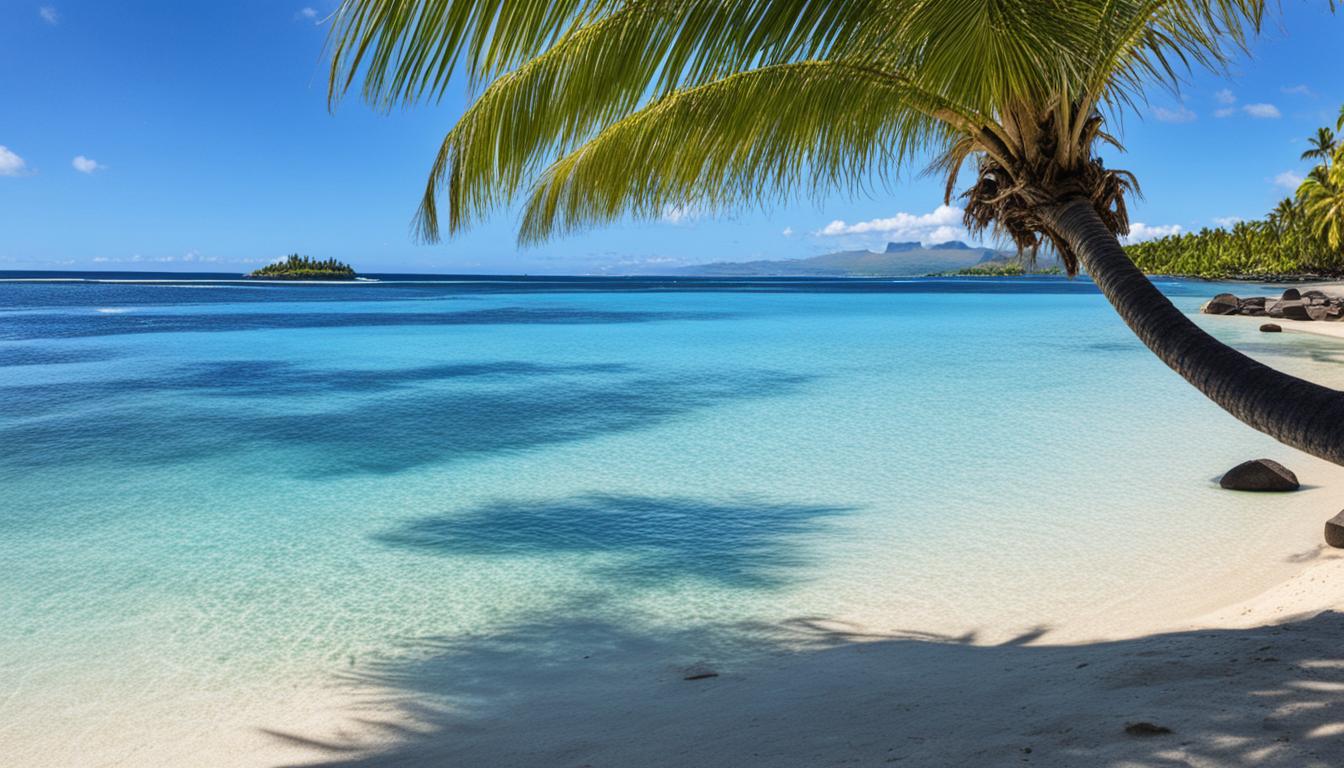Mauritius is a tropical paradise, located 1,490 miles off the east coast of Africa. Despite its remote location, this small multicultural island nation is known for being safe. It boasts a thriving tourism industry. The biggest danger here might be getting a sunburn.
The overall crime rate in Mauritius is very low. Petty theft and non-violent crimes are the most common. While downtown Port Louis and central tourist areas see a bit more crime, the island is still very safe for visitors. Like with any place you visit, it’s crucial to be cautious and take the right steps to stay safe.
Indeed, demonstrations can happen in Mauritius, like in any country. They can quickly turn violent, causing traffic jams. The cyclone season from November to April might also disrupt some services. Travelers should keep an eye on the weather and talk to their tour operator about any changes.
Key Takeaways
- Mauritius has one of the lowest crime rates in the world, with petty theft and non-violent crimes being the most common.
- Downtown Port Louis and central tourist areas have a slightly higher crime rate, but the island is generally very safe for travelers.
- Demonstrations can occur and turn violent, leading to traffic congestion.
- The cyclone season runs from November to April and can disrupt necessary services.
- Visitors should stay aware of weather forecasts and communicate with their tour operator for any necessary changes.
Understanding Crime in Mauritius
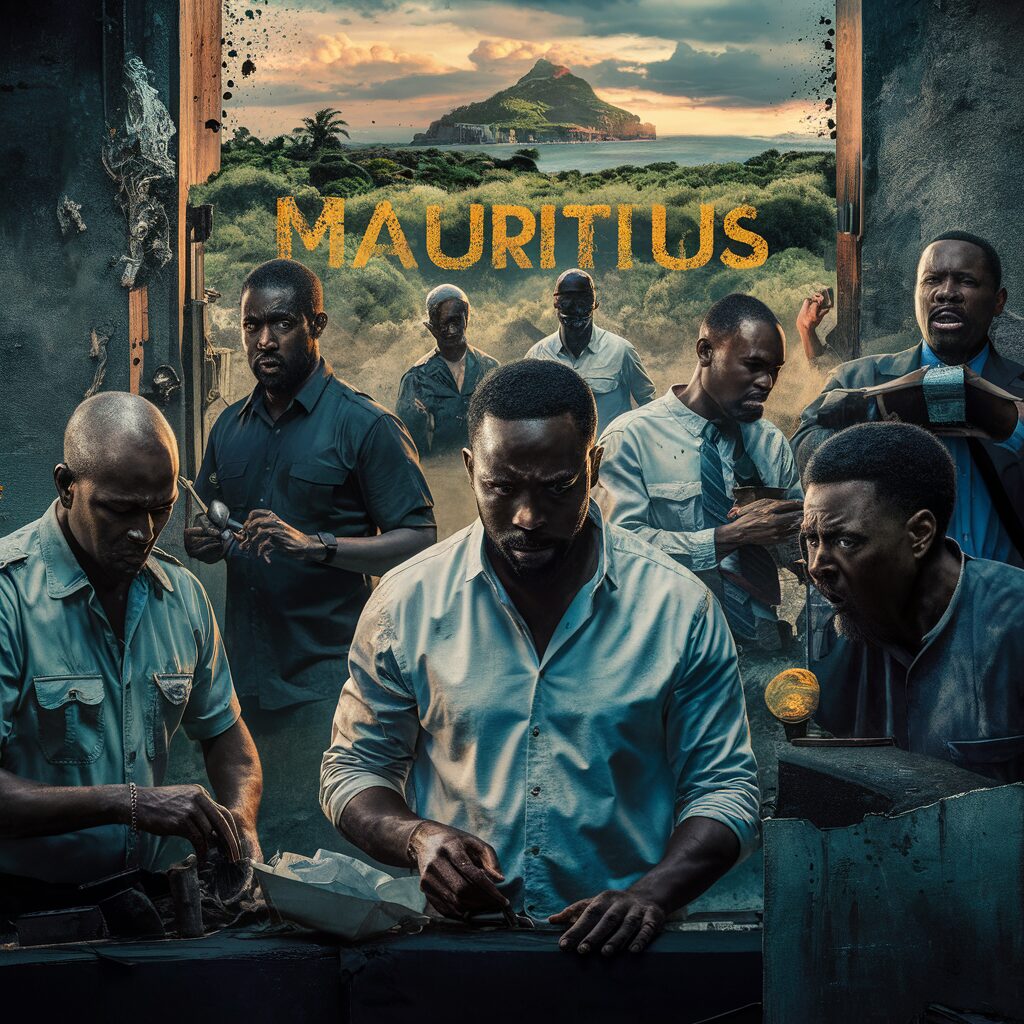
Mauritius is known for its low crime rate. Most crimes are small like pickpocketing. The capital, Port Louis, and main tourist spots may see a bit more crime. But, the island is still very safe for visitors.
Low Crime Rates
Mauritius stands out as one of the safest in Africa. It has remarkably low levels of violent crime. People mostly face minor crimes like pickpocketing or small thefts.
Petty Theft and Non-Violent Crimes
While crime is low, it’s wise to be careful. Watch out for petty theft, especially in busy tourist spots. You might come across situations like purse snatching or car theft.
Safety Precautions in Tourist Areas
To stay safe, avoid walking alone at night. Keep your valuables safe and be careful in beach bungalows. Remember, staying alert like you would anywhere else is key to a great visit.
Is Port Louis Safe?
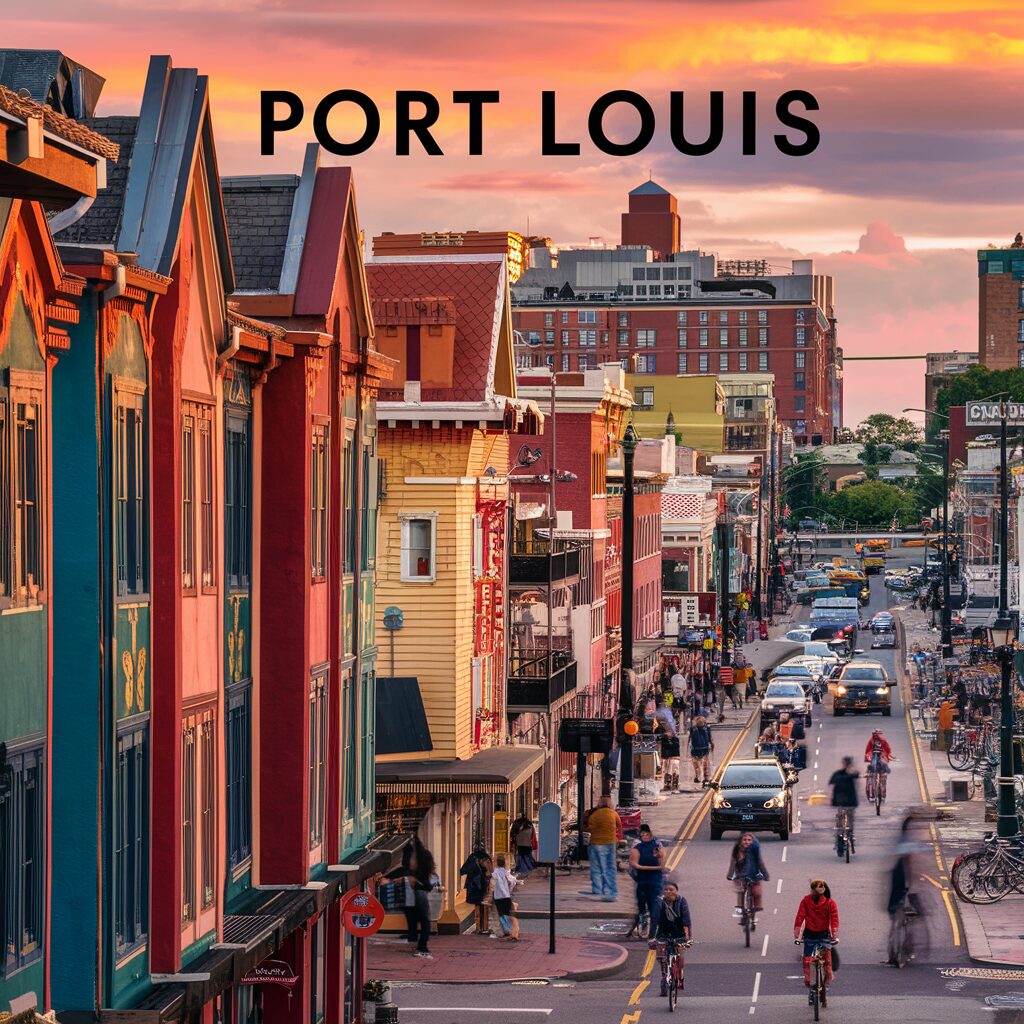
Many international airport tourist desks don’t cover activities in Port Louis, Mauritius’ capital. This city is home to 170,000 people. Most tourists go right to their luxury resorts, skipping the city’s rich culture. But, Port Louis is safe for visitors. While there are beggars around the markets, their approach is mild and not pushy.
Exploring the Capital City
Port Louis is the heart of Mauritius, alive with its unique culture. In the capital, you’ll find lively markets, historic spots, and different neighborhoods to explore. These places offer a real taste of the country’s life and traditions.
Well-Lit Streets and Bustling Areas
Walking at night in Port Louis is safe with its bright waterfront and busy streets. The city’s nightlife and business areas create a sense of security. They have lots of lights and a lot of people around. This makes it unlikely for crimes to occur.
Transportation and Road Safety
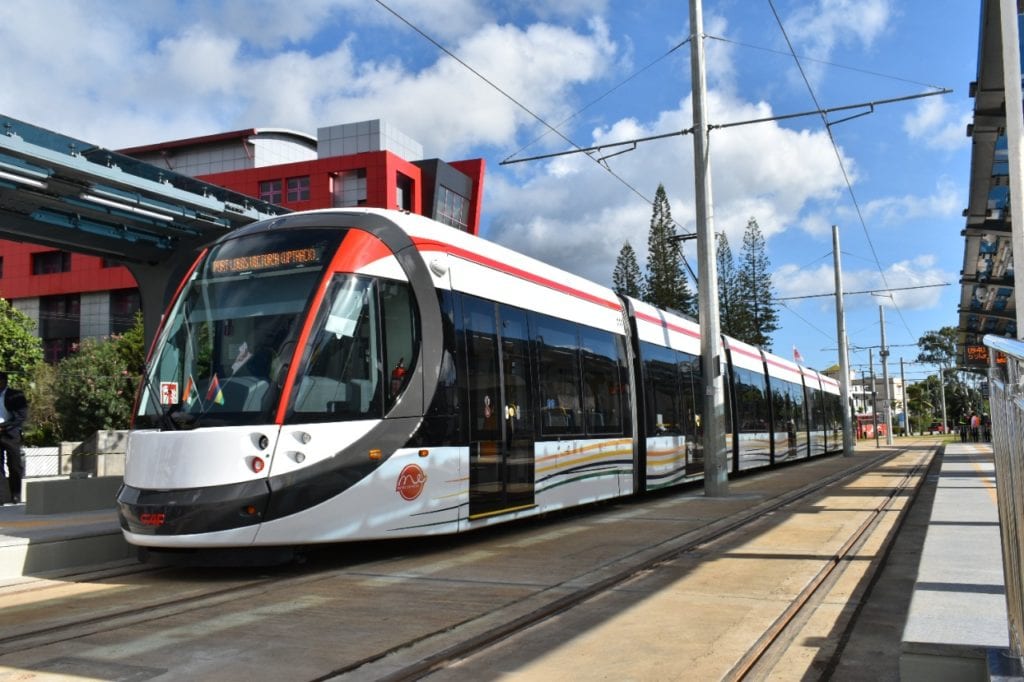
Driving in Mauritius needs extra care. The island is improving its roads, adding expressways that link towns. But, heavy traffic and drivers ignoring signals can be challenging.
Road Infrastructure
The road system in Mauritius isn’t as good as in some tourist spots. There are expressways between major towns and a light rail system, the Metro Express, to help. However, these connecting roads can get very crowded, causing delays.
Traffic Congestion and Driving Etiquette
Heavy traffic, especially on roads to the expressways, is a key issue. Locals don’t always follow traffic rules. So, it’s wise to beep your horn at intersections. Make sure to leave early for your destination to deal with these delays.
You can also read: Is Australia safe to visit?
Public Transportation Options
If you’d rather not drive, public transport is a great option in Mauritius. Buses are free for students, the disabled, and seniors since 2005. But, they can be crowded, and you might have to stand. Help for bus routes can usually be found at hotels or big shops, not the bus stations.

Local Laws and Customs
In Mauritius, many people follow Hinduism. They are known for being polite and respect their customs a lot. To fit in and show respect, wear clothes that are not revealing when you leave your place of stay. Use long pants or shirts, and also long skirts, to cover your shoulders.
It’s against the law to bring in or sell drugs in Mauritius. The penalty for this is very serious, a life sentence. Also, don’t forget that bringing in cigarette papers is illegal too. If you need to take any special medicines, make sure you have your doctor’s note with you and permission to carry them.
Dress Code Guidelines
Outfits in Mauritius should match the local standards. This means picking clothes that cover your body when you’re out and about. Choose long sleeves or pants. It will make things smoother and show you respect their way of life, especially the Hindu community.
Health Concerns and Natural Hazards
When going to Mauritius, it’s wise to know about health issues and dangers. One major problem is Chikungunya, a virus spread by mosquitoes, much like dengue. It’s most active from October to May, the warmer months in Mauritius. Protecting yourself from mosquito bites is critical. Even though malaria isn’t an issue on the island, visitors from malaria-infected areas might need a blood test when they arrive.
Mosquito-Borne Illnesses
Chikungunya causes high fever, joint pain, and a rash. It affects visitors during the island’s hot season. You can lower your risk by using bug spray and wearing long clothes.
Cyclone Season Precautions
The cyclone season in Mauritius is from November to May. Keep an eye on the local news and the weather. Also, stay in touch with tour guides or locals. It’s good to register with your country’s embassy, too. This will help you be safe if bad weather comes.
Wildlife Hazards
Besides sicknesses, there are wildlife dangers to watch out for. You might run into sea urchins, gash your feet on glass, or get hit by a stonefish. There are also stray dogs that can be fierce. Being careful and alert while exploring outdoor areas in Mauritius is important.
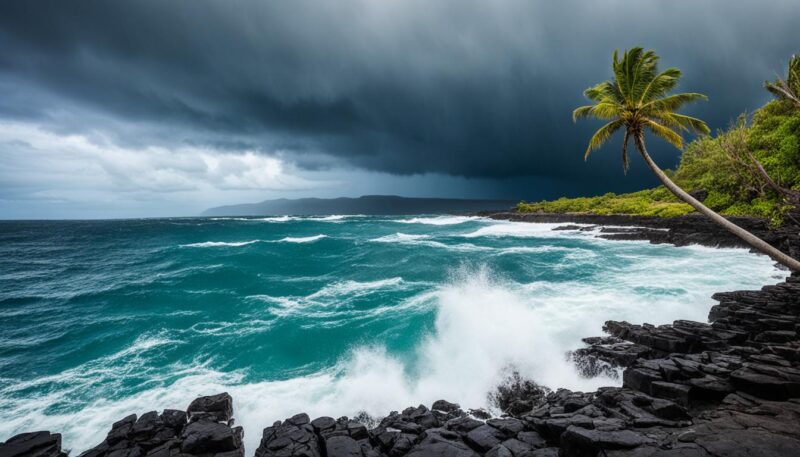
Travel Tips and Advisories
Travelers heading to Mauritius should keep a few things in mind for their safe stay. Follow these Mauritius travel tips and Mauritius travel advisories for a great trip.
ATM Safety
The local currency, the Mauritian rupee, is essential. It’s best to exchange money at the airport. When using ATMs, be careful. Sometimes, despite debiting your account, they do not give cash.
Photography Guidelines
To photograph local people, always ask for permission first. Also, make sure to keep your camera safe. This helps avoid Mauritius photography guidelines theft.
Lost Passport Procedures
If you lose your passport, take some essential steps. Report the loss to the local police and your embassy. They’ll help you get a new passport following Mauritius lost passport procedures.
Conclusion
Mauritius is a welcoming place for tourists. It has a low crime rate and good facilities for visitors. However, it’s still vital to be careful when traveling.
Visitors should know the local laws and customs. Also, it’s wise to be cautious about transportation, health, and natural dangers. This helps ensure a safe and fun trip.
With the right preparations and being alert, Mauritius can be a terrific travel spot. Travelers can focus on enjoying the island’s beauty and culture. This way, their journey is secure and unforgettable.
FAQ
Is Mauritius safe to visit?
Mauritius is safe for tourists, with low crime and good facilities. However, be cautious about local laws and customs. Also, be careful with transportation, health, and natural dangers.
What is the crime rate like in Mauritius?
Crime is very low in Mauritius. Most issues are about petty theft and non-violent crime. Areas like downtown Port Louis may have more crime, but it’s generally safe for tourists.
Is Port Louis, the capital, safe to visit?
Yes, Port Louis is safe. While you might see some beggars, they are not pushy. The well-lit waterfront and busy areas are fine at night.
What are the transportation and road safety considerations in Mauritius?
The island’s roads can be challenging, but there are highways and a light rail. Traffic jams and disregard for traffic signals are common. Remember to honk at intersections. Buses are busy, so you might need to stand during your journey.
What should I know about local laws and customs in Mauritius?
The local population is mainly Hindu and quite conservative. To be respectful, dress modestly off your lodging, covering shoulders and legs. Avoid drugs and illegal materials, and respect local laws.
What health and natural hazards should I be aware of in Mauritius?
Watch out for illnesses like chikungunya and malaria. Bring proof of vaccinations if you’re visiting from an at-risk place. Cyclones happen from November to May. Be cautious of the wildlife, including sea animals and stray dogs.
What other travel tips and advisories should I keep in mind?
ATMs sometimes have issues. Be careful when using them. Always ask permission before photographing locals and keep valuables safe. If you lose your passport, notify the police and your embassy right away.
Source Links
- https://www.worldnomads.com/travel-safety/africa/mauritius/mauritius-a-tropical-paradise
- https://moafrikatours.com/is-mauritius-safe
- https://www.holidify.com/pages/is-mauritius-safe-782.html
